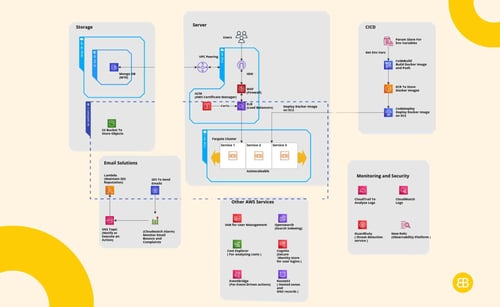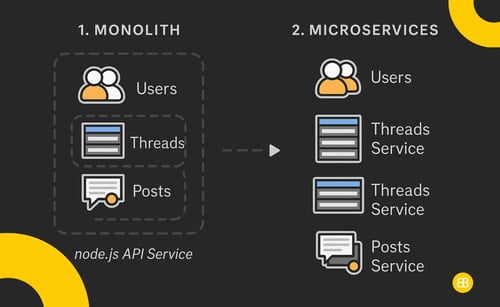Table of Contents
“What if this actually works?”
It’s a quiet but powerful question — the one every founder secretly hopes for.
Your app takes off. Users sign up. Investors lean in. You’re growing faster than expected.
But here’s the real question: Is your app ready for that growth?
Because scaling isn’t just about getting more users. It’s about making sure your tech can handle them — without crashing, lagging, or locking you into an expensive rebuild.
At EB Pearls, we build with scale in mind from the start — not as an afterthought.
This is the story of how we do it.
1. You Don’t Just Need an App — You Need One That Grows With You
We’ve seen too many founders fall into the same trap.
They focus on speed to market. They launch a quick MVP. It works well enough… for a while.
But then growth kicks in — and suddenly:
-
The app starts slowing down.
-
Every new feature causes bugs in five other places.
-
Dev time doubles. Costs triple.
-
The architecture that “worked fine back then” can’t keep up.
The result? Teams stall. Users churn. Founders burn out.
The scary part? This can happen even with a solid idea and decent execution.
That’s why we don’t just ask: “What do you want to build?”
We ask: “What happens when this succeeds?”
Because building for growth isn’t optional anymore — it’s the baseline for anything with ambition.
2. Why “How It’s Built” Matters More Than Most People Realise
If you’re not technical, it’s easy to think:
As long as it works, it works, right?
But here’s the truth: Every shortcut in early development becomes a speed bump later.
And eventually, speed bumps become roadblocks.
We’ve rebuilt apps that were live for less than a year.
Not because the business model was flawed — but because the codebase couldn’t scale.
The right architecture, tooling, and testing early on can save you hundreds of thousands later.
You don’t need to understand the code.
You just need a partner who’s thinking about what happens after launch.
3. Our Approach: The ScaleSmart™ Engineering Framework
At EB Pearls, we follow our ScaleSmart™ Engineering Framework — a proven system for building apps that grow with your business, not against it.
It combines:
-
Modular microservices architecture
-
Continuous Integration/Delivery pipelines
-
Automated QA and performance testing
-
DevSecOps practices from day one
-
AI-enhanced developer tooling
This isn’t just best practice. It’s how we consistently deliver apps that go the distance.

4. Microservices: Building in Blocks, Not Bricks
Think of your app like a house.
Would you rather build it as one big concrete slab — or as flexible rooms you can renovate individually?
That’s the difference between monoliths and microservices.
What Are Microservices?
Instead of one giant codebase, we break your app into independent components.
Each one handles a specific task — like payments, messaging, user profiles — and can be updated or scaled on its own.
Why It Matters for You:
-
Add new features without affecting old ones
-
Handle 10x traffic spikes without everything crashing
-
Deploy faster, test faster, recover faster
Netflix, Uber, and Amazon all use microservices — because they have to scale.
We bring that same mindset to startups and growth-stage businesses from day one.

5. CI/CD: Ship Faster, Safer, Without the 3am Rollbacks
Launching new features shouldn’t feel like rolling a dice.
With Continuous Integration and Continuous Deployment (CI/CD), we automate:
-
Code testing
-
Security checks
-
Live deployment
Every update goes through a reliable, repeatable pipeline — not a rushed, manual process.
For You, This Means:
-
Faster release cycles (weekly, not quarterly)
-
Safer updates (fewer bugs)
-
Happier users (less downtime)
Stat check:
Companies with mature CI/CD pipelines deploy 208x more frequently and recover 106x faster from incidents. Source: Accelerate: State of DevOps Report by Google Cloud & DORA
(Visual: EB Pearls’ CI/CD Pipeline Flow — From code to production in minutes)
Typical performance we deliver:
-
Deployment time: 8–15 minutes from staging to live
-
Rollback support: Instant reverts via GitHub Actions + Infrastructure as Code (IaC)

6. Automated Testing: How We Stop Bugs Before They Ever Reach You
Imagine launching with confidence — not crossed fingers.
We don’t rely on manual testing alone. We use:
-
Unit tests (to test small parts of your code)
-
Integration tests (to test how features work together)
-
End-to-end tests using platforms like TestSigma
Our Testing Stack:
-
Regression test coverage across all core user journeys
-
Automated browser/device matrix validation (TestSigma)
-
API-level contract tests
Every time your developers push code, these tests run automatically.
The Result?
-
Bugs caught early = cheaper to fix
-
Reduced QA effort = faster delivery
-
Better experience = better reviews
Pro tip:
Fixing a bug after launch costs 6x more than fixing it during development (IBM Systems Science study).
(Graph: Cost of Bug Fixing Over Time — Why early testing saves thousands)
7. Developer Superpowers: AI Tools That Speed Us Up (Without Cutting Corners)
Your project isn’t just about how many hours it takes — it’s about how much value we deliver per hour.
We use AI tools like:
-
GitHub Copilot to speed up code writing
-
Codium for smart documentation and test generation
-
SonarQube to catch quality issues early
These tools let our engineers move faster — without losing precision.
What This Means For You:
-
Cleaner code
-
Fewer bugs
-
Faster delivery = better ROI
We still apply strong human review. But with AI in the mix, we move like a team twice our size.
8. Security Built In — Not Bolted On
Security isn’t something we add at the end. It’s baked into every step of development.
Our DevSecOps Practices
| Practice | Tool | Outcome |
|---|---|---|
| Dependency scanning | Snyk | Detect vulnerabilities in real-time |
| Code quality analysis | SonarQube | Flags high-risk logic, code smells |
| Pipeline gating | GitHub Actions | Blocks non-compliant code from deploy |
| Secrets management | AWS KMS / Vault | Secures API keys & sensitive data |
Your Benefits:
-
Meet compliance standards from day one
-
Avoid reputation-damaging breaches
-
Build trust with users, partners, and investors
Real stat:
61% of small businesses hit by a cyberattack fold within 6 months (source: Cybersecurity Ventures).
9. What Happens If You Skip This? (A Cautionary Tale)
Let us tell you about “Startup X.”
They had funding. A solid team. A great idea.
But they chose the fastest, cheapest dev shop they could find — just to get the MVP live.
Six months in, they were growing.
But suddenly:
-
They couldn’t add features without breaking others
-
User complaints spiked
-
Tech debt ballooned
They had to rebuild from scratch — right when momentum was highest.
They lost users. Burned cash. Missed funding milestones.
They didn’t fail because of product-market fit.
They failed because their tech couldn’t keep up.
Don’t build a house on sand.
10. What This Actually Looks Like in the Real World
We’ve helped:
-
A peer-to-peer lending startup scale from MVP to 50,000+ users with <1% downtime
-
A healthtech platform deploy new features every week with zero regressions
-
A real estate app reduce critical bugs by 85% using test automation
And we’re still their partners today — because we didn’t just build, we scaled with them.
11. If You’re Thinking Long-Term — This Is the Kind of Partner You Want
We’re not just here to code.
We’re here to guide you through:
-
The complex tech choices
-
The growth inflection points
-
The things you didn’t know you needed to know
We build with care, speed, and strategic clarity — so you can move fast without breaking things.
12. FAQs
Do I really need microservices if I’m just starting out?
How long does CI/CD take to set up?
How do I know you're testing things properly?
What if I want to pivot later?
13. Let’s Build Something That Can Grow With You
You don’t need all the answers right now.
You just need a team that’s already thinking five steps ahead.
Whether you're building your first version or preparing for a scale-up, we’re here to help you do it right — with clarity, confidence, and care.
👉 Ready to Build Like It’ll Actually Work?
We’ll sit down — founder to founder — and unpack what success could really look like for your app. No jargon. No pressure. Just a real conversation about how to build something that won’t fall apart when the good stuff finally happens.

Akash, COO at EB Pearls, blends technical expertise with business acumen, driving the creation of successful products for clients.
Read more Articles by this Author.jpg?length=460&name=How%20We%20Build%20Apps%20That%20Scale%20From%2010%20to%2010%20Million%20Users%20(Without%20Breaking%20Along%20the%20Way).jpg)